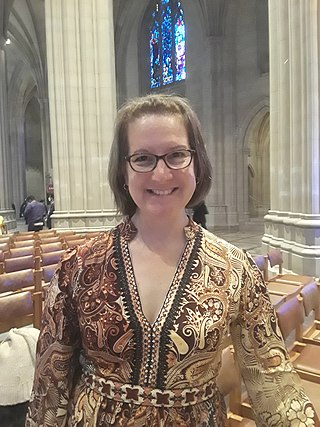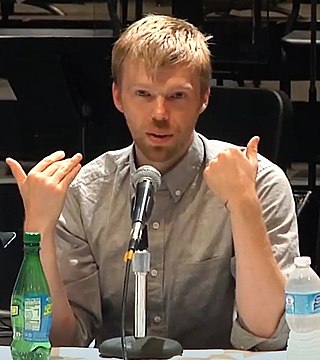Related Research Articles

John Luther Adams is an American composer whose music is inspired by nature, especially the landscapes of Alaska, where he lived from 1978 to 2014. His orchestral work Become Ocean was awarded the 2014 Pulitzer Prize for Music.

Jin Hi Kim is a composer and performer of komungo and electric komungo, and a Korean music specialist.
Meriwether Lewis Spratlan Jr. was an American music academic and composer of contemporary classical music.
Thomas Oboe Lee is a Chinese American composer.
The Boston Modern Orchestra Project (BMOP) is a professional orchestra in Boston, Massachusetts, United States.
Harold Meltzer is an American composer. Harold is inspired by a wide variety of stimuli, from architectural spaces to postmodern fairy tales and messages inscribed in fortune cookies. In Fanfare Magazine, Robert Carl commented that he "seems to write pieces of scrupulous craft and exceptional freshness, which makes each seem like an important contribution." The first recording devoted to his music, released in 2010 by Naxos on its American Classics label, was named one of the CDs of the year in The New York Times and in Fanfare; new all-Meltzer recordings will issue from Open G Records (2017), Bridge Records (2018), and BMOP/Sound (2019). A Pulitzer Prize Finalist in 2009 for his sextet Brion, Meltzer has been awarded the Rome Prize, the Barlow Prize;, a Guggenheim Fellowship, and both the Arts and Letters Award in Music and the Charles Ives Fellowship from the American Academy of Arts and Letters.
Kenneth A. Radnofsky is an American classical saxophonist. He specializes in the alto saxophone, but plays the soprano and other sizes as well. He currently teaches at the New England Conservatory of Music, and Boston University.

Vache Sharafyan, is an Armenian composer of symphonic works, chamber music, choral music and opera. His works include 2 acts opera King Abgar, ballet Second Moon, 2 acts ballet Ancient Gods, one act ballet “the bride of the desert”.
Eric W. Sawyer is an American orchestral composer, pianist and professor of music at Amherst College. He has studied as an undergraduate at Harvard College, where he was selected as a Harvard Junior Fellow. He undertook graduate studies at both Columbia University and the University of California, Davis. Before taking up the position at Amherst, Sawyer spent four years as Chair of Composition and Theory at the Longy School of Music.
21st-century classical music is Western art music in the contemporary classical tradition that has been produced since the year 2000. A loose and ongoing period, 21st-century classical music is defined entirely by the calendar and does not refer to a musical style in the sense of Baroque or Romantic music.

Kati Ilona Agócs is a Canadian-American composer and a member of the composition faculty at the New England Conservatory of Music in Boston, Massachusetts.

Lisa Carol Bielawa is a composer and vocalist. She is a 2009 Rome Prize winner in Musical Composition and spent a year composing as a Fellow at the American Academy in Rome.
Ken Ueno is an American composer.
Gil Rose is the founder and conductor of the Boston Modern Orchestra Project (BMOP), founder and General-Artistic Director of Odyssey Opera, Artistic Director of Monadnock Music Festival, Professor of Practice at Northeastern University, and Executive Producer of the record label "BMOP/sound."
Patrick Greene is an American composer and performer of contemporary classical music. A lifelong resident of New England, he has been based in Boston, Massachusetts, since 2008.

Andrew Norman is an American composer of contemporary classical music whose texturally complex music is influenced by architecture and the visual arts. His string trio The Companion Guide to Rome (2010), was a runner-up for the 2012 Pulitzer Prize for Music. While composer-in-residence for the Boston Modern Orchestra Project, he first gained international attention for the orchestral work Play (2013), which was nominated for the 2016 Grammy Award for Best Contemporary Classical Composition and won the 2017 Grawemeyer Award for Music Composition. He received another Grammy nomination for the orchestral work Sustain (2018), a commission from the Los Angeles Philharmonic. Other noted works include the fantasy for piano and orchestra Split (2015) and the opera A Trip to the Moon (2017). Since 2020, Norman has been on the composition faculty of the Juilliard School.
Play is a piece for orchestra in three movements by the American composer Andrew Norman. The work was commissioned by the Boston Modern Orchestra Project, for whom Norman was then composer-in-residence. It was first performed on May 17, 2013 by the orchestra under the conductor Gil Rose. The revised version was premiered by the Los Angeles Philharmonic conducted by Gustavo Dudamel on October 28, 2016.
Janna Baty is an American mezzo-soprano opera singer. She is best known for her singing in contemporary music and operas. Baty is also a professor at the Yale School of Music where she directs the student opera.
Armenian Rhapsody No. 2 was composed by Alan Hovhaness in 1944 during the portion of his life when he lived near Boston and began to reconnect with his Armenian roots. Hovhaness wrote this piece during his so-called "Armenian period" from 1943 to 1951, where he was heavily influenced by not only Armenian and other Middle Eastern music but also Indian music.
Karol Bennett is an American soprano known for her performances of lieder, chanson, and oratorio and her championing of music by living composers.
References
- ↑ "Premieres | BMOP". www.bmop.org. Retrieved 2017-02-23.
- ↑ "Theodore Front Musical Literature - Shock Diamonds : For Orchestra (2007)". www.tfront.com. Retrieved 2017-02-23.
- ↑ England, Classical Voice of New. "BMOP's Masterful Execution of an Eclectic Array of Contemporary Music". www.cvneweng.org. Retrieved 2017-02-23.
- ↑ Adams, Erica H. "Boston Modern Orchestra Project (BMOP) Enlivens Audiences and Completes 12th Season with". www.berkshirefinearts.com. Retrieved 2017-02-23.